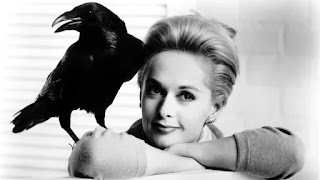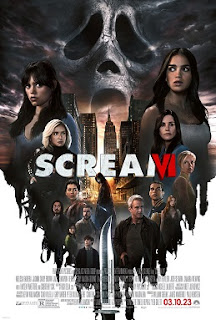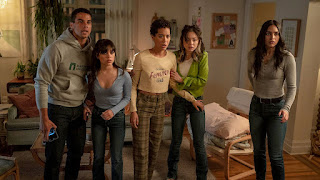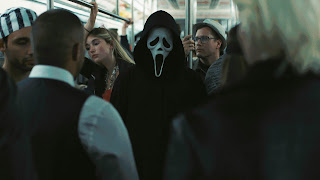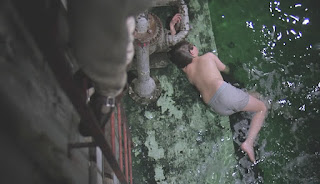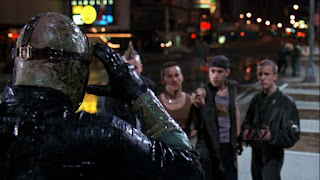Ever since it was announced in October of last year that James Gunn and Peter Safran were taking the reigns of the DCU in film, TV and animation as the co-chairs and co-CEOs of DC Studios, suddenly there was a question as to how the remaining films in the pipeline - Blue Beetle, Aquaman and the Lost Kingdom, The Flash and Shazam! Fury of the Gods - were going to fit in to the soon to be rebooted DCU. Of those four, The Flash remained the most relevant because it was specifically about the DC multiverse and is rumored to be a reset of DC on film, emulating the "Flashpoint" storyline in the comics that reset the DC timeline. The other three films, however, suddenly felt unmoored from whatever the new status quo was going to be. More detached than any of them, arguably, was Fury of the Gods.
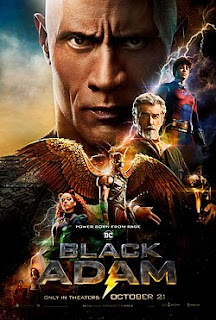
With the last DC film released prior to the Gunn/Safran announcement being Black Adam, the Shazam corner of the DCU already had a pall of failure hanging over it. Whatever the behind the scenes business decisions were that prompted Warners to want to reboot the DCU, as the last film in theaters before that shake up, Black Adam had the appearance as being the last nail in the coffin for whatever the DCU used to be. When you have a post credit scene that hypes the return of Henry Cavill's Superman and a whole new direction for the DCU and a month later, audiences are told that all of that is dead it's not the kind of thing that helps generate buzz for Shazam 2, you know?

Even if a new era of DC on film wasn't impending, though, and even if whatever Black Adam has set up was still part of the plan, I think Fury of the Gods would have still struggled to find an audience. Not every superhero can necessarily support a sustainable franchise and Shazam is an example of that. There are a few problems that come with attempting an ongoing Shazam series, which Fury of the Gods only serves to highlight.

The number one problem is dealing with the advancing age of Billy Batson. Billy needs to be a kid for Shazam as a concept to work. You could argue that Billy, as played by Asher Angel, was already a little too long in the tooth in 2019's Shazam! but at least he was young enough where it was still do-able. But Angel was seventeen in 2019 and playing a fourteen year old. He's now twenty and there's only so much you can fudge his age. They even acknowledge in the movie that Billy is about to turn eighteen and that's way too old. As a result, Angel barely appears in Fury of the Gods. He's grown up so much it's distracting to have him around so he's almost wholly absent from the film in favor of just having Zachary Levi as Shazam and it drains the sequel of the heart the original had.

Adding to Fury of the Gods' problems is that seeing Angel on screen as a visibly mature young man makes Levi's portrayal of Shazam as the same goofball he was in the original strike a false note. In the first film, there wasn't a jarring disconnect between how Angel played Billy and how Levi played Shazam. You could go along with the idea that they were the same person. That's no longer the case. Levi is still playing Shazam in the same awkward, gee whiz manner but that doesn't jibe with how Angel comes across as Billy, even in the short amount of time that he appears on screen. Given his age, there would just be no way for Angel to adjust his performance to make it match up to what Levi is doing without it coming across as weird. The reality of it is that he's an adult now so having him transform into a superhero who still acts like he's a kid in an adult's body just doesn't work. If they had really wanted to do Shazam as a franchise, to at least get a trilogy out of it, they would have had the foresight to cast Billy very young to start with. By casting Angel as Billy, they guaranteed that there'd be no real legs to this series and the delays to the sequel caused by Covid sure didn't help them to beat the clock.

So from the start there's a major issue with Fury of the Gods that's difficult to work around. But aside from being forced to sideline Billy, there's also the problem of dealing with the larger Shazam family. Having Billy grant his foster siblings powers made for a rousing climax to the original Shazam! but now having five other superheroes with the exact same power set and trying to give them all interesting roles to serve in this storyline is a real challenge. Jack Dylan Grazer as Billy's physically disabled foster brother Freddy Freeman gets the most screentime, with Freddy being drawn into a romantic subplot with the goddess Anthea, played by Rachel Zegler. There's two problems with this, though. One, bumping up Freddy's role only calls attention to the fact that we barely see Billy. Whereas the first film was very much centered on Billy, here it feels like Freddy is the main character. He's the only hero that we spend significant time with in their civilian guise, with Freddy being depowered for a long stretch of the film. Two, Grazer just isn't - to my mind, at least - particularly likable as Freddy. Granted, this may strictly be my own personal reaction but I find Freddy to be truly the most unsympathetic handicapped character on film since Franklin in the original Texas Chain Saw Massacre. I do not find him endearing. I find him abrasive and annoying and that isn't really conducive to getting invested the character's love life. Especially when you find it impossible to believe that anyone would want to voluntarily spend time with this person, much less be enchanted by them. But, as I said, I concede that my aversion to Grazer's performance may be unique to me. I felt the same way about him in the first film but he was used sparingly enough that it didn't affect my overall enjoyment of the movie. Here, not so much. But whether you like Freddy or not, it's still a problem that he's prioritized over Billy. It gives us a sequel where we're no longer following the character that we were invested in.

Another obstacle for Shazam as a series that Fury of the Gods fails to find a satisfying resolution to is the matter of Shazam's name. Due to Marvel having trademarked "Captain Marvel," DC has been unable to use that name in any promotion or marketing since 1972. Despite that, DC still continued to refer to the character in stories as Captain Marvel while using "Shazam" as the title of the comic but in 2012 they officially changed the character's name simply to Shazam. While I get the motivation behind it, it was a dumb move and that dumb move gets painfully repeated here.
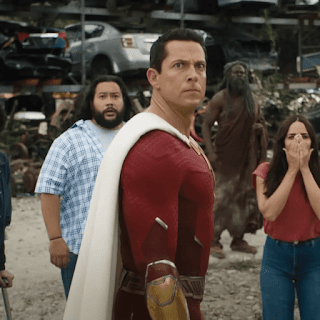
In Fury of the Gods's last scene, the wizard at long last finally reveals that Shazam's superhero name is, wait for it...Shazam and while this is treated as a "Duh, of course!" revelation I wish that rather than cut to the end credits they had continued this scene in order to dump on its idiocy. I mean, we're supposed to call Levi's character Shazam. But yet that's also the name of the wizard. And the other five characters with Shazam powers are all called Shazam too. So we have a wizard called Shazam and six superheroes called Shazam and, by the way, none of the superheroes can say their name without changing back to their civilian identities.

Years ago, when DC learned that they could no longer use the Captain Marvel name, they should have created a new code name for the character. Using "Shazam" is fine for promotional purposes. You can still call the comic Shazam, you can call the movies Shazam but within the stories you have to give these characters names they can use to refer to themselves and also to one another that doesn't transform them back and forth whenever they say it. Going with Shazam as the character's name has always been such a lazy, zero effort, "eh, that'll do" branding decision and having that be the big reveal before the end credits brings the movie to a close on an enervating note rather than a rousing one. I can't blame the filmmakers because this is a purely corporate decision regarding the character that they're obliged to play along with but I just think it's crazy that no one on the comic book side fixed this shit years ago and now a film franchise is saddled with this dopey decision.
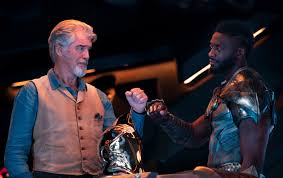
Finally, let's have a few words about the two end credits scenes, both of which I think should have been left out. The first brings in Emilia Harcourt (Jennifer Holland) and John Economos (Steve Agee) from Peacemaker as they wander out to some abandoned gas station out in the woods where Shazam is practicing shooting lightning bolts at empty soda cans. They're approaching Shazam in the hopes that they can interest him in taking a spot in the Justice Society but on the nerdy nitpicking front I have to wonder why Shazam is practicing zapping cans like he's just learning his powers when he's been doing this for years? I mean, just in this movie he literally took down actual Gods so I think we're past the target practice stage. More critically, though, the fact that this tease is about bringing Shazam into the JSA is a problem because we all know that's not gonna happen. The Justice Society is dead in the DCU. If it comes back, it isn't going to be with Shazam in it or with any of the characters from Black Adam. So why not just drop this scene altogether?

Then there's the second tease with the return of Sivana and Mister Mind with Mister Mind once again appearing in Sivana's cell to talk to him about his big plans for the two of them to work together only to have Sivana blow up in frustration at continuing to be kept waiting. On the one hand, the self-awareness of acknowledging that the end credit tease for the first movie went absolutely nowhere is admirable. However, it also serves as a sad comment on how little pay off there's been in the DCU. How many post credit scenes in the now ten year history of the DCU have gone anywhere? When the post credit tease of your previous film promised the return of Henry Cavill's Superman only to purge him from the DCU just a few weeks later, I'm not sure how smart it is to hilariously point out that these teases are mostly bullshit.

Fury of the Gods is, at best, an inoffensively bland superhero outing with forgettable villains (even Helen Mirren can't breath much life into her character of Hespera) and a string of big battles that fail to engage. As a CGI laden superhero adventure, it's greatest sin is being thoroughly average. More critically, it's hindered by the one thing that makes Shazam difficult material for a sustainable live action franchise - it can't stop its main actor from aging out of the requirements of the role and the efforts made to try to work around that (like limiting that actor's screen time to what amounts to a cameo appearance) only pushes this sequel into feeling like generic superhero fare.

It was probably too optimistic to expect lightning to strike twice with a second Shazam! but as a fan of the character and a fan of the first film, I was hoping that returning director David F. Sandberg could pull it off. I do think he did as well as he could but a second Shazam! just came with too many hurdles to overcome. The first film was one of the most solidly entertaining and charming DCU films but the sequel feels warmed over, like a movie that missed both its moment and its mark. It's greatest value going forward is likely to be as an archival artifact of the end of the DCU as we knew it. With its big DCU cameo being from Gal Gadot's Wonder Woman, whose own future in the DCU is uncertain, Fury of the Gods has the feel of watching a TV show that was abruptly cancelled without the time to plan for a proper finale.




